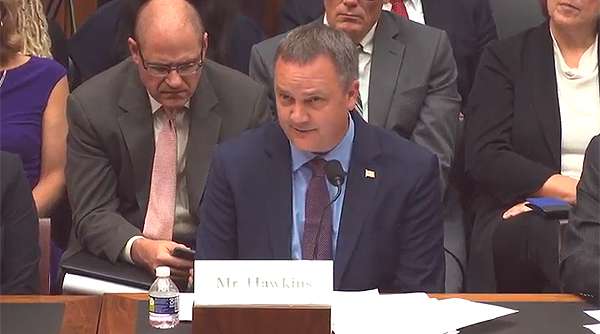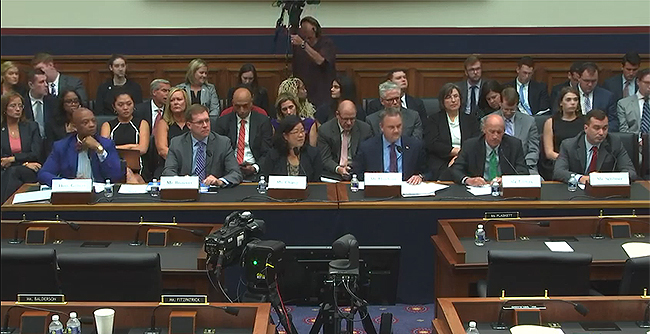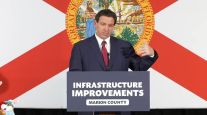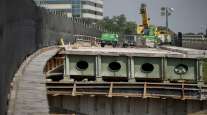Senior Reporter
YRC’s Darren Hawkins Questions Tolling’s Viability at House Hearing

[Stay on top of transportation news: Get TTNews in your inbox.]
WASHINGTON — As policymakers evaluate viable long-term approaches to fund the country’s transportation network, a trucking industry executive warned against relying on tolling.
Darren Hawkins, president and CEO of YRC Worldwide, emphasized the industry’s concerns with the conversion of existing toll-free interstate highway lanes to tolled facilities during a hearing of the House Highways and Transit Subcommittee.
In a lengthy critique of tolls, Hawkins highlighted the cost often associated with collection, the potential for traffic diversion, and instances of unfair subsidization.
“While the trucking industry is willing to pay its fair share for infrastructure improvement, we believe that tolls are not the right solution, and in fact can be very harmful to our industry, customers and ultimately, to consumers,” said Hawkins, who represented American Trucking Associations at the hearing.
“Clearly, from a highway user’s perspective, the waste that goes into collecting a toll is simply unacceptable when far more efficient alternatives are available,” he added, noting ATA supports the federal adoption of a fee on hybrid and electric vehicles to make up for their minimal contribution to fuel taxes.
Additionally, ATA has proposed adopting a 20-cents-per-gallon fee on motor fuels collected at the wholesale rack and phased in over four years at 5 cents per year.
According to ATA, if this Build America Fund were to be enacted it would generate $340 billion in approximately 10 years.
Amending the federal ban on tolling interstate highways falls under Congress’ jurisdiction. Absent significant upgrades and repairs to key freight and commuter corridors, congestion has worsened at major metropolitan regions, other stakeholders told lawmakers at the hearing.
Traffic congestion resulted in an annual cost to the trucking industry of $74.5 billion in 2016, according to a study by the American Transportation Research Institute .
Despite a persistent call-to-action from nearly every aspect of the freight community, transportation leaders have not demonstrated a sense of urgency.

Witnesses testifying before the House Subcommittee on Highways and Transit during the Sept. 11 hearing on "Pricing and Technology Strategies to Address Congestion on and Financing of America’s Roads." (transportation.house.gov)
The looming shortfall of a highway account backed by revenue from the fuel tax was not addressed in surface transportation legislation the Senate Environment and Public Works Committee advanced in July. House Transportation and Infrastructure Committee Chairman Peter DeFazio (D-Ore.), expected to unveil a response to the Senate bill, seemed to share stakeholders’ frustration at the start of the hearing.
“Around here we’re paralyzed. We can’t figure out how we’re going to pay for this,” said DeFazio. “When you drove to work today you drove by the gas station — it probably went up a nickel or down a nickel on the digital sign. No one’s going to notice that. And people around the country have shown that they are willing to pay to get out of congestion.”
The panel’s top Republican, Rep. Rodney Davis of Illinois, championed a funding approach that would encompass multiple systems. As he put it, “If we are going to tackle congestion, we need a thoughtful approach that provides states and local communities with the flexibility to do what makes sense given their unique circumstances, because no single solution is going to work everywhere.”
Congress has not raised the 24.4 cents-per-gallon diesel tax and 18.4 cents-per-gallon gas tax since 1993. The American Society of Civil Engineers, a supporter of a federal fuel tax increase, issued a D+ grade for the country’s infrastructure in 2017.
In 2018, the Trump White House had recommended a 10-year, $1.5 trillion private sector-centric infrastructure plan meant to revamp the country’s infrastructure. The proposal was not picked up by the Republican-led Congress at the time. The White House has not unveiled a comprehensive plan since the start of the divided government session of Congress this year. President Donald Trump and House Democrats abandoned discussions on infrastructure policy in May, with the president focusing instead on foreign policy and immigration in the lead-up to his re-election bid.
YRC Worldwide, based in Overland Park, Kan., ranks No. 6 on the Transport Topics Top 100 list of the largest for-hire carriers in North America.




